|
|
| Line 134: |
Line 134: |
| === Bank of Aliso === | | === Bank of Aliso === |
|
| |
|
| A large structure erected in Aliso City, the Bank of Aliso serves as the hub of economic activity | | A large structure erected in Aliso City, the Bank of Aliso serves as the hub of economic activity on the planet. Not only does it operate as the primary bank of the Clan, with several branches scattered around the planet, but it also serves as a front for Theodorosa “Rosa” Equinario’s operations. On the surface, she is running and operating the bank completely legally and above board, but it can also serve as a base of operations and resource, granting Rosa several high-level contacts. |
| on the planet. Not only does it operate as the primary bank of the Clan, with several branches | |
| scattered around the planet, but it also serves as a front for Theodorosa “Rosa” Equinario’s | |
| operations. On the surface, she is running and operating the bank completely legally and above | |
| board, but it can also serve as a base of operations and resource, granting Rosa several | |
| high-level contacts. | |
|
| |
|
| The bank itself is rather large and spacious, designed with a simple utilitarian effectiveness | | The bank itself is rather large and spacious, designed with a simple utilitarian effectiveness reminiscent of a sleek and modern building that isn’t particularly assuming on its own. However, it towers over the other nearby buildings, being much taller than it is long. On the inside, on the other hand, its wealth is much more apparent. |
| reminiscent of a sleek and modern building that isn’t particularly assuming on its own. However, | |
| it towers over the other nearby buildings, being much taller than it is long. On the inside, on the | |
| other hand, its wealth is much more apparent. | |
|
| |
|
| With several floors dedicated to various legal and extralegal activities, it has a state of the art | | With several floors dedicated to various legal and extralegal activities, it has a state of the art security system and most civilians won’t be allowed on the upper floors without expression permission from the bank owner. The bank was originally owned by members of the Willing, but since taking it over, Rosa has rotated most of her own staff into key positions. The bank still is quite functional in its intended purpose, keeping the Plagueian economy running smoothly, but that’s exactly what makes it such a good front. |
| security system and most civilians won’t be allowed on the upper floors without expression | |
| permission from the bank owner. The bank was originally owned by members of the Willing, but | |
| since taking it over, Rosa has rotated most of her own staff into key positions. The bank still is | |
| quite functional in its intended purpose, keeping the Plagueian economy running smoothly, but that’s exactly what makes it such a good front | |
|
| |
|
| | === The Door === |
| | |
| | Near the edge of Aliso city, where the industrial sector meets residential there is a small decrepit |
| | house with a faded red durasteel door nestled snugly between two derelict factories. This unassuming two-story home nicknamed the door, is owned by Chie-da Vaddond, a frail-looking older Weequay woman who has owned her home in Aliso City since the days of the CIS occupancy of the world. Yet no matter who comes through nor how many times they try, she refuses to give up her decades-old home. Beneath its rough exterior both “The Door” and it’s elderly owner hide a dark secret. Through the kitchen, down the stair and into the cellar there is a false wall, tucked behind a movable shelving unit which when opened reveals the entrance to a vast underground facility owned by Rosa Equinario. |
| | This underground facility acts as the base of operations for criminal enterprises of Rosa’s underworld empire. The facility is known among its users and inhabitants simply as the bunker, but it is much more than that. A labyrinth of duracrete tunnels acts as both a shortcut for travel across Aliso City with various exits in key areas make smuggling a breeze for Rosa’s team while massive storage rooms scattered throughout the bunker house the many items they deal in, whether legally or illegally procured. |
| | |
| | A staff of up to 150 people can be found within the facility at any given time ranging from security to ensure that there are no unwanted guests, to staff simply conducting constant |
| | inventory checks to ensure that none of the goods housed within go missing. Most of the staff within the facility live within the bunker in a section of staff housing that is little more than |
| | glorified barracks that are also used as “safe houses” for members of the crew who need to lay low for a bit. Housing the staff within “The Bunker” minimizes the chances of drawing attention with constant traffic entering through “The Door” and other similar entryways. |
|
| |
|
| {{Plagueis}} | | {{Plagueis}} |
| | | |
| [[Category:Plagueis locations]] | | [[Category:Plagueis locations]] |
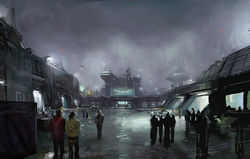
|
| Aliso City
|
|
Aliso
|
|
Temperate
|
|
Light urban
|
|
Human
|
|
Various
|
|
Basic
|
|
211,000
|
|
Plagueis
|
Aliso City is the primary settlement on Aliso. Under the control of Clan Plagueis, it can be described as the nucleus of the Clan's operations and presence on the planet. The city is constructed atop a plateau and extends eastward from the Clan’s headquarters, The Pinnacle. Originally comprised of utilitarian structures left behind by the forces of the Confederacy of Independent Systems, or CIS, new infrastructure has developed as the population has grown.
Overall Structure
Aliso City is, for lack of a better definition, a frontier city. Before Plagueis occupied the planet, Separatist forces controlled the Pinnacle and other military buildings, outposts, and industry located along the western side of the plateau. These were ultimately abandoned during or after the Clone Wars, falling into disrepair and obsolescence before Plagueian forces arrived planetside.
Before and after Plagueian occupation, Aliso City began to naturally expand eastward due to a settling immigrant population and transient merchants taking an interest in the returning industry and military operations emerging from Aliso. The organization of the city beyond the position of the Pinnacle and its complexes, consequently, is most affected by the specific demographics of those who reside within its borders, with each neighborhood’s structure, economics, and culture differing from the next. This means that, unlike sprawling metropolitan cities, Aliso City is not strictly cut up into districts or boroughs, nor does it follow a planned, pre-laid out grid. It is a diverse patchwork of commerce and trade, simultaneously urban and rustic, and continually evolving as the numbers of visitors, citizens, and Plagueian forces continue to grow.
History
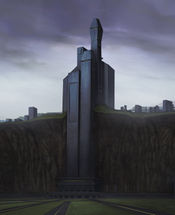 The Pinnacle, located on the western end of Aliso City.
The Pinnacle, located on the western end of Aliso City.
The origins of Aliso City begin with a chance encounter. In the aftermath of the Battle of Florrum, the entirety of Clan Plagueis pursued numerous ‘undesirables’ - primarily non-Human sentients - and followed them to the Aliso system. These undesirables were eventually captured or killed after taking refuge in a former Separatist prison facility now known as the Pinnacle. The Pinnacle occupied a strategic geographical location, and though many of its facilities were gutted or inoperable, the foundations for developing a complex and secure command center remained. While the majority of the Clan’s leadership focused on revitalizing the Pinnacle and other nearby outposts, the rest of the city began to naturally expand eastward due to the growing populace and the activities of both Clan personnel and the large slave population.
While Selika Roh, Plagueis’s Proconsul at the time, directed most Clan efforts toward the reconstruction of the Pinnacle, others were tasked with early oversight of the outlying region. The first priority identified was the need to establish basic necessities to support the Clan proper. This included preparing large swaths of land for agriculture and other organic cultivation, erecting minimal shelters and barracks for the Plagueian legions, repairing and expanding the existing spaceport below the plateau, and developing infrastructure to support the production of basic industrial goods necessary for settlement and expansion.
Though located on the edge of the Unknown Regions, the sheer scale of activity and manpower required for the redevelopment of the Pinnacle attracted eyes and ears that lurked in nearby sectors. At first, many were hesitant to approach Aliso, as they were wary of what was clearly large-scale military activity on the planet. However, the attitude of caution slowly shifted with a significant influx of foreign starships delivering goods and personnel from Plagueis’s distant holdings across the galaxy. Independent opportunists also arrived on the planet, and it was decided for the benefit of Clan operations that the majority of new arrivals would be left untouched, though the opportunity to bolster the ranks of the Ascendant Legion with fresh specimens meant that a few immigrants disappeared from time to time.
Inevitably, the size of the settlement increased even as rumors of Plagueis’s presence in the system spread. Within a year of the Pinnacle’s reactivation, the surrounding outposts had exploded into a thriving frontier settlement. Though small in comparison to several similar, well established municipalities in the Outer Rim territories, the city’s existence and growth were remarkable considering its distance from the more widely explored galaxy.
Following the discovery of a large Geonosian hive on the planet in 35 ABY, Aliso City suffered from a brief and brutal assault. The damage was widespread, but the economy bounced back effortlessly following the conflict’s resolution. The harmonious combination of the industrial power and prowess of the Ascendant Clan, as well as the ingenuity and the dedication of the population to their home, assured that the city easily returned to full capacity. Clan Plagueis’s victory and subjugation over the Geonosians proved that the organization was an institution capable of defending its interests in the region. As long as the regular citizenry remained indifferent to the operations of the Clan - and vice versa - Aliso City would continue to expand and develop.
Plagueis-Aliso Relations
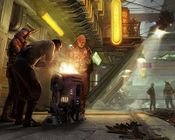 The streets of Aliso City.
The streets of Aliso City.
The dynamic between Plagueis and the rest of Aliso’s population is one of either ignorance or apathy. While certain individuals residing within the city will occasionally leave the general populace in order to serve the Clan, there is no overwhelming tension between the proceedings of the Plagueis ruling council and the activities of the non-Force sensitive citizenry. The doctrine of the Dread Throne is to focus primarily on the Clan’s needs rather than Aliso City’s. However, the presence of various prominent businesses within the city have prompted the council to work out trade agreements with multiple company owners, subtly persuading them to rely on Plagueis for the sake of maximizing resource supply and profits. This way, while the Clan does not directly interfere with Aliso politics, its members' contributions are considered crucial to regional contractors and investors who have vested interests in the system’s newfound economic prosperity.
Some Plagueians express skepticism regarding their summit’s indifference toward the settlement. While some members of the Clan are supportive of treating the frontier city like a fiefdom or dominion, others would rather see any dealings outside Plagueis dismantled or purged, as they view them as a liability to the unit’s operations and secrecy. None of these concerns, of course, hold much weight in the decisions that the Dread Lord ultimately makes, as much of the commentary stems from those who are not trusted advisers or council members. Though what passes for a local city government does make a token effort at policing the population, much of what most would identify as "law enforcement" flows directly from Plagueian troops and paramilitary forces loyal to the Clan. While the Dread Lord doesn't focus too closely on what these forces choose to prioritize as far as their policing efforts are concerned, they can and will execute the Dread Lord's will.
Landmarks and Locations
Aliso City has many distinct establishments and structures that serve multiple purposes to both the Ascendant Clan and to regular citizens. While some of these locations are strictly limited to Plagueis operations and uses, others are iconic staples of the city at large.
Geonosian Enclave
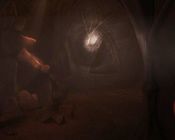 Geonosian tunnels below Aliso City.
Geonosian tunnels below Aliso City.
The Geonosian Enclave is a complex tunnel system formerly inhabited by the Valneikian hive located east of Aliso City. The age and purpose of the caverns are unclear, as there is no information on it from the Separatists’ forgotten databases, though the Hive was rumored to have been conducting classified weapons research within its depths. The original inhabitants have since been evicted from the caves and relocated to a region south of the city. Due to the lack of upkeep required to maintain the subterranean colony, the damage caused to the tunnels during the recent Plagueian assault remains unaddressed.
The Enclave can be accessed on the surface through three separate entrances. While the smaller and more distant entryways are located away from the Pinnacle, the entrance closest to the city was recently conceived using powerful explosives in order for the Geonosians to launch a surprise attack on the new Plagueian settlement. While the other entrances lead deeper into the tunnel system, the large passageway closest to Aliso City is notable for a large cavern that likely housed the Geonosians' former army of B1 battle droids. The intricate labyrinth is a nest of twists and turns designed to confuse potential intruders, ultimately leading to various strategic focal points. These paths lead to another cavern near the center of the former colony that originally housed the Geonosian queen. It can now also be accessed from above after a Plagueian strike team destroyed the ceiling to confront the Geonosian leadership.
While Plagueis had originally planned to excavate the caverns in order to further develop their infrastructure and resources, the destruction and carnage found within the tunnels have seriously delayed or even outright halted efforts by rock riggers and engineers to survey and carve out the stone. In some instances, the enclave will be used as a last resort bolt hole, due to the presence of minerals that are known to scatter sensors. Apart from that, all official operations within the vacant Geonosian tunnels have ceased until the Clan is ready, or willing, to clean up the mess.
D & D Construction Yards
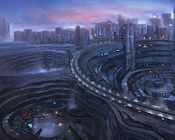 D&D Construction Yards at night.
D&D Construction Yards at night.
The Duracrete & Durasteel Construction and Infrastructure, Refinement and Assembly Yards, also known as the D & D Construction Yards, are located to the northwest of the Pinnacle. Originally utilized by the Separatists for the purpose of creating duracrete and assembling pieces of durasteel for industrial uses, the facilities have now been upgraded and remodeled so that both droids and the Subjugated work to manage building materials for Plagueis in order to expand and maintain the infrastructure of Clan-owned buildings and outposts.
The yards are divided into specific structures based on their services. Large metal refinement machines are used to purify durasteel so that it can be ready for building needs. Within the duracrete refinery, materials are sent off to be stored, shipped, or shaped into functional molds. Loaders, transports, and personnel operate from a small cluster of administrative offices, in which construction contracts and bonds with both the Clan and other Alisoan organizations are drawn up and processed.
Work conditions within the Construction Yards are harsh but tolerable. Subjugates who work within the refinery and among the machinery seldom receive breaks, but the labor is not as backbreaking as expected, and the presence of droids to assist them is welcomed. Only the Willing, however, are lucky enough to hold down desk jobs and bear the responsibility of supervising both the financial and logistical aspects of the facilities.
The Medina
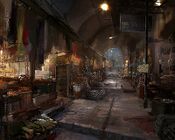 The Medina's marketplace.
The Medina's marketplace.
Located to the southeast of the Pinnacle, the Medina quarters of Aliso City have an obscure history but a clear role in the lives of Plagueis’ slave population. Allegedly built by the Separatists, the Medina is a sprawling labyrinth of covered and dimly lit corridors, tunnels, and maze-like paths, many leading to larger isolated areas that may have been intended as personal rooms or storage facilities. While a few of these tunnels are visible above ground, most of them are built slightly underground, some of them even running between several of the buildings and outposts that surround the Pinnacle.
Several theories abound as to why the Medina was constructed in the first place. One suggestion that has been floated is that the Separatists desired an emergency shelter in case of orbital bombardment or invasion, and the complexity and size of the tunnels could make enemy infiltration difficult and frustrating. Another idea involves black market operations or even more risque forms of entertainment that the CIS may have wanted to keep private. Regardless of speculation, the original purpose of the labyrinth remains a mystery.
In more recent months, the Medina has become a lively hub of activity and culture, but it is entirely restricted to Plagueis’ slave population. Several of the long, narrow tunnels, once an individual learns where they go, lead to places where rations are served, minimized forms of gambling are permitted, and living quarters are arranged. There are few exits and entrances to the Medina, and consequently, the whole array feels stifling and claustrophobic, as well as confusing to navigate. This is perfectly fine with the Dread Lord, who believes that while Plagueis’ slaves may be allowed certain privileges, they certainly should not be made too comfortable in their abodes.
The Medina is heavily patrolled from all sides by members of the Willing, Ravagers, and Wraiths in order to monitor who goes in or out of its labyrinth. Should hints of dissent or rebellion be discovered, the entire area can be sealed off, and both supply lines and energy from the power grids can be easily shut down. The Plagueis ruling council finds the arrangement appropriate for managing and accommodating the slave population, especially appreciating the Medina’s aesthetic. After all, the constrictive nature of the tunnels and the immense scope of surveillance limits slaves’ physical mobility and freedom, making their presence in the Medina akin to mindless, ambling cattle inside a slaughterhouse.
The Sand Pit
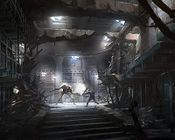 Combatants in a duel in the Sand Pit.
Combatants in a duel in the Sand Pit.
Contrary to popular belief, the Sand Pit is not, in fact, filled with sand. It was established on the northwestern outskirts of Aliso City and serves as a fighting ring for both members of the Willing and Clan Plagueis. The Sand Pit, or simply the Pit, is the colloquial name for an arena that is notorious for brutal, and sometimes gladiatorial, combat.
Originally excavated by the Separatists for unknown purposes, the site was abandoned during the Clone Wars and rediscovered by Plagueis. The Plagueis ruling council held no interest in further updating or adding to the Pit, but many members of the Willing were enthusiastic about turning the space into an arena or amphitheater. This proposal was accepted, provided that the structure be somewhat small in nature and not particularly eye-catching. Constructing the Pit also allowed the Clan to purge the ranks of the slave population when needed, sending Ravagers and Wraiths who had outlived their usefulness to be killed in combat. Ultimately, individuals within the lower echelon of the Ascendant Clan developed an outlet outside of their duties to relax, drink, watch some sparring matches, or even participate in the fighting themselves.
Though the hollow of the Pit itself is approximately two meters, the surrounding stands measure twelve meters - equivalent to the height of a two-story building - and the area itself is covered and seemingly nondescript from a distance. Installed within the galleries are numerous durasteel benches that have been shabbily pieced together with recycled material from the D & D Construction Yards. The only intriguing element of the otherwise plain-looking space is the abundance of murals of Krayt dragons painted along the walls of the stands. A single concession booth provides spectators with food choices such as Bantha shish kebabs, Berbersian crab salad, and fried crispics. The same booth also offers a selection of beverages, both alcoholic and not, that includes Corellian spiced ale, lum, mead, and the Pit’s staple cocktail: The Sandy Sith, which consists of Kowakian rum, Lyme's rose juice, and a splash of Corellian nectar. It is said that if a fighter can pound three Sandy Siths in one sitting, then they can get a free ticket out of fighting their opponent.
Entertainment within the Pit ranges from one-on-one combat to team clashes to free-for-all sudden death brawls. In between sentient matches, spectators can enjoy fights in which battle droids are given blunt weapons and expected to wail on one another for the audience’s amusement. While there is no official gambling element within the establishment, many members of the Willing will bet on the outcome of certain matches. Rumor has it that select members of Plagueis itself also frequent the Sand Pit, either participating in the bouts or sitting back with food and drink and enjoying the violent display.
Landsdown Docks
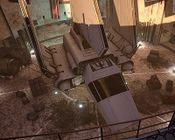 One of the Landsdown Docks docking bays.
One of the Landsdown Docks docking bays.
While Clan Plagueis maintains its own spaceport, Aliso City is also host to the Landsdown Docks, which are situated on the easternmost flank of the city and farthest away from the Pinnacle. While the docks mostly cater to transient merchants and traveling businessmen, it is also common to see Aliso residents utilize them for their personal ships and freighters.
Designed after similar ports found in the Outer Rim, the Landsdown Docks are wide and flat, with the exception of multiple rows of divots built into the duracrete and durasteel in order to accommodate ships of multiple classes. Once a pilot has landed their vehicle, they are able to easily access public transportation leading away from the port. Repair droids are available for rent, capable of refueling ships and offering other maintenance needs. Tools may also be requested from a small scrap and parts shop located on the southern edge of the docks, though the purchase of said tools is not always cheap.
The Landsdown Docks are divided into three separate bay types spread haphazardly across the area of the spaceport. While the smallest bays mostly house fighters and smaller vessels, the mid-sized bays can support a wider range, including Firespray-class ships, LAAT gunships, and large scale transports. Only a few of the largest bay types have been constructed, capable of hosting much larger freighters. A crew of live personnel are on standby if any droids must be activated for appropriate tasks, as well as a small medical team, just in case ship maintenance and repairs happen to go awry.
Located in the free space between the various bays are a wide array of shops, inns, and small cafés, generally accommodating to travelers who do not intend to stay on Aliso for long. The Landsdown Café brews a particularly strong cup of caf, and the Shipyard Stop serves foodstuffs such as pepper pretzels and Nerf nuggets. Many of the establishments are relatively small and humble, but they do the job of sating the hunger and other needs of pilots and merchants alike. Beyond these fixed locations, there are many small stalls operated by merchants of all types, vending both wares and food to the spacers that frequent the port.
Mobus Combine
Unique among the establishments of the Landsdown Docks is the Mobus Combine. Located in a nondescript building opposite the Landsdown Café, it serves as a trading post and business hub for ambitious and entrepreneurial visitors to Aliso. Whether one is searching for a wealthy investor to fund a commercial venture or a keen individual confident in their brutish abilities, the Combine serves as the frontier of pioneering business interests in the city. Members of the Willing are known to frequent the premises and offer their services to the highest bidder, though the Combine is open to all who can prove their worth.
The interior of the structure is spacious and sparsely furnished. Upon entering the Combine, attention is drawn toward a long desk located in the far-left corner on the ground floor. A service droid takes note of all patrons entering and exiting the premises, and it provides assistance and information for various queries. The droid is also tasked with maintaining an electronic dashboard behind the desk that displays all pending contract proposals. Opposite the service desk is a single lift that provides access to the second floor, which mirrors the first in architectural design. The top floor of the Combine is furnished with simple durasteel tables and benches where patrons can sit and discuss the details of their potential partnerships.
Hak’s Hideout
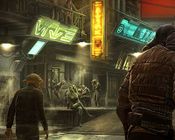 The exterior of Hak's Hideout.
The exterior of Hak's Hideout.
A small and seemingly indistinct cantina on the eastern edge of the city, Hak’s Hideout has served as a drinking hole for pilots utilizing the Landsdown Docks, travelers, and Aliso residents. It was founded by a family of Bothan immigrants, with the proprietorship passed down to the son of the original owner in recent months.
Hak’s has a wide variety of alcohols from around the galaxy, including a rotating series of ales and wines depending on the season. The owner is also able to bring in a monthly supply of rare and high-quality whiskey, including Whyren's Reserve, which is actually made somewhat affordable due to marketing expertise. The cantina’s most notable aesthetic is that its tap spigots are refurbished from decapitated B1 battle droid heads. Naesc, the staple bartender of the establishment and the owner’s brother, has quite the story to tell regarding these spigots should any patrons happen to ask about them.
The Nimbus Room
A cheap drinking establishment in the seedier part of the city, The Nimbus Room is often frequented by those who can't or won't patron the nicer clubs in the city. No one really remembers who built it, nor do they really care.
Having remained innocuous for most of its history, the Nimbus Room has become the topic of discussion in recent weeks following a terrible atrocity taking place within its walls. A man by the name of Tren Coltar was brutally tortured and subsequently murdered on the premises. Attacked by a man in black armor, brandishing a red lightsaber, Coltar was pinned to the wall by his wrists with two shards of metal, with all the skin of the front of his torso flayed off. The emblem of the Inquisitorious was painted on the wall behind Coltar in his very blood.
The Hyperdyne University
Originally a small engineering college constructed shortly after the colonisation of Aliso, the Hyperdyne University was eventually taken over by Hyperdyne Industries not long after the arrival of Clan Plagueis as the company sought to get it claws into everything it could. The modern Hyperdyne University is little more than a training facility for Hyperdyne, but even some of Plagueis' Force users have been known to enrol in certain classes. 99% of all students of the University leave with a job at Hyperdyne, with at least half of those also sponsored by the company.
The actual building has grown to be among the largest in Aliso City, with space for dozens of students to both live and learn on-site, as well as accommodation for the majority of the staff. Aliso City's own relatively small size has prevented the University from growing to the size that it can start to attract potential students from the galaxy at large.
Bank of Aliso
A large structure erected in Aliso City, the Bank of Aliso serves as the hub of economic activity on the planet. Not only does it operate as the primary bank of the Clan, with several branches scattered around the planet, but it also serves as a front for Theodorosa “Rosa” Equinario’s operations. On the surface, she is running and operating the bank completely legally and above board, but it can also serve as a base of operations and resource, granting Rosa several high-level contacts.
The bank itself is rather large and spacious, designed with a simple utilitarian effectiveness reminiscent of a sleek and modern building that isn’t particularly assuming on its own. However, it towers over the other nearby buildings, being much taller than it is long. On the inside, on the other hand, its wealth is much more apparent.
With several floors dedicated to various legal and extralegal activities, it has a state of the art security system and most civilians won’t be allowed on the upper floors without expression permission from the bank owner. The bank was originally owned by members of the Willing, but since taking it over, Rosa has rotated most of her own staff into key positions. The bank still is quite functional in its intended purpose, keeping the Plagueian economy running smoothly, but that’s exactly what makes it such a good front.
The Door
Near the edge of Aliso city, where the industrial sector meets residential there is a small decrepit
house with a faded red durasteel door nestled snugly between two derelict factories. This unassuming two-story home nicknamed the door, is owned by Chie-da Vaddond, a frail-looking older Weequay woman who has owned her home in Aliso City since the days of the CIS occupancy of the world. Yet no matter who comes through nor how many times they try, she refuses to give up her decades-old home. Beneath its rough exterior both “The Door” and it’s elderly owner hide a dark secret. Through the kitchen, down the stair and into the cellar there is a false wall, tucked behind a movable shelving unit which when opened reveals the entrance to a vast underground facility owned by Rosa Equinario.
This underground facility acts as the base of operations for criminal enterprises of Rosa’s underworld empire. The facility is known among its users and inhabitants simply as the bunker, but it is much more than that. A labyrinth of duracrete tunnels acts as both a shortcut for travel across Aliso City with various exits in key areas make smuggling a breeze for Rosa’s team while massive storage rooms scattered throughout the bunker house the many items they deal in, whether legally or illegally procured.
A staff of up to 150 people can be found within the facility at any given time ranging from security to ensure that there are no unwanted guests, to staff simply conducting constant
inventory checks to ensure that none of the goods housed within go missing. Most of the staff within the facility live within the bunker in a section of staff housing that is little more than
glorified barracks that are also used as “safe houses” for members of the crew who need to lay low for a bit. Housing the staff within “The Bunker” minimizes the chances of drawing attention with constant traffic entering through “The Door” and other similar entryways.